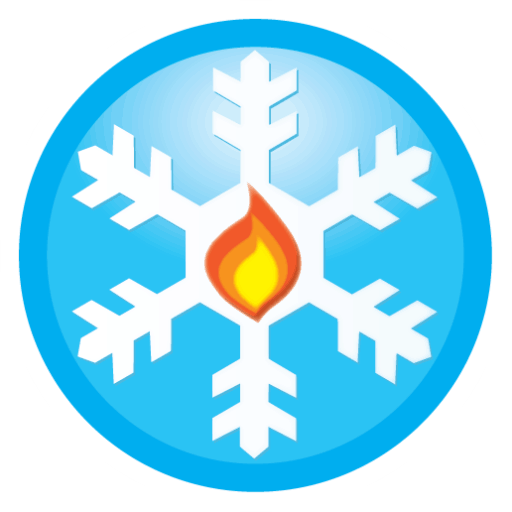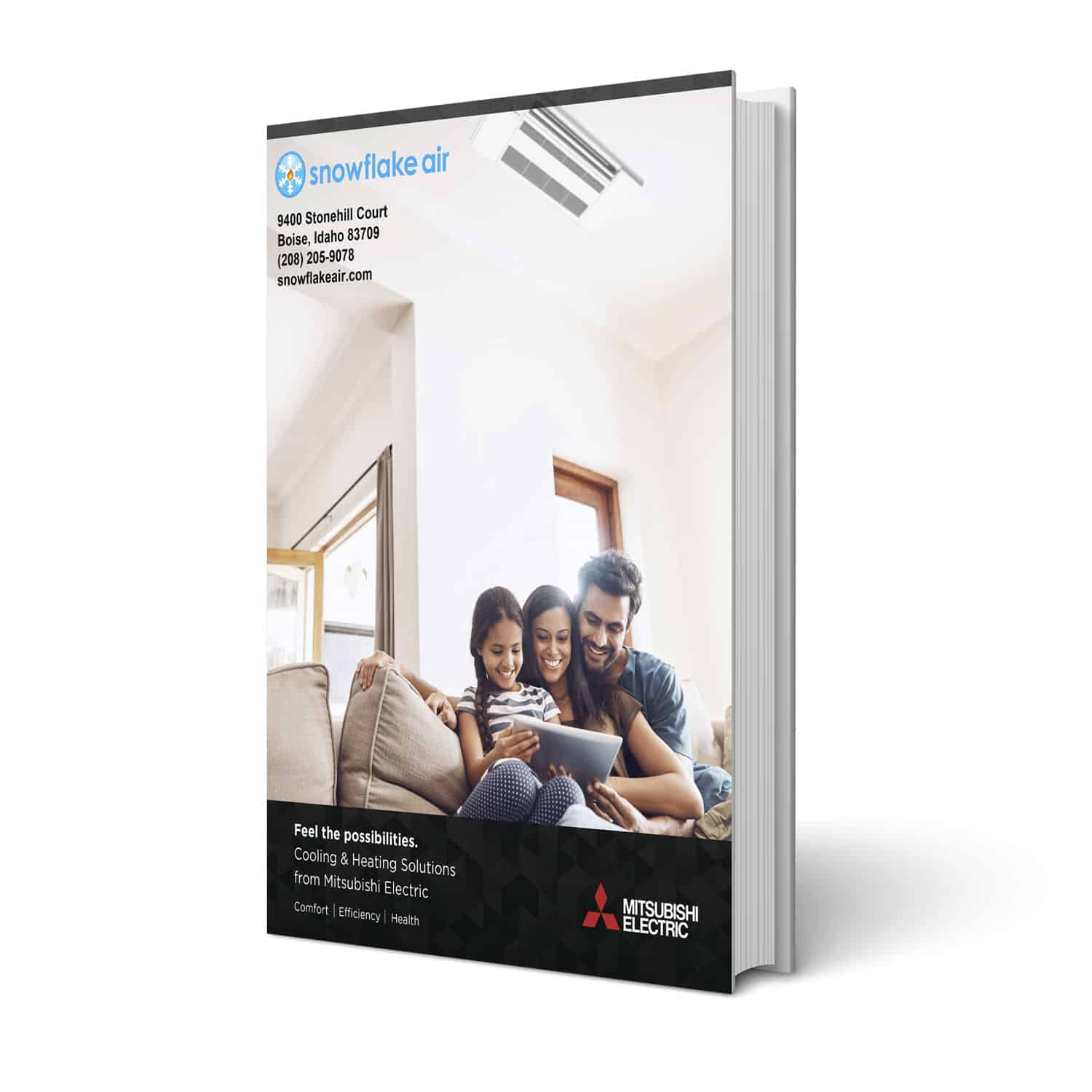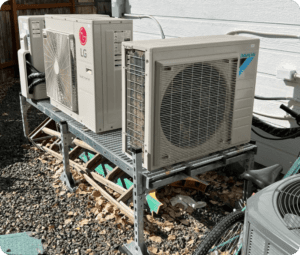 Heat pumps can last up to 20 years. Occasionally, we’ll see ones that last longer. But, the average is around 15. And, they retain their efficiency very well. Meaning, they won’t use too much more electricity as they get older.
Heat pumps can last up to 20 years. Occasionally, we’ll see ones that last longer. But, the average is around 15. And, they retain their efficiency very well. Meaning, they won’t use too much more electricity as they get older.
Unless something’s wrong, of course. And, you need to do some essential maintenance to keep it working that well.
Overall, these units are a significant upgrade over conventional heating and cooling. A heat pump that’s the right size for your home provides better heating and cooling and uses way less energy.
So, you end up with much better comfort while paying much on your bills every month.
You may have heard that these aren’t good for winters here in Idaho. But, that’s not true anymore. Today’s heat pumps work year-round in Boise Metro and Valley County. You’ll get all the heating and cooling you’ll need.
If you’re thinking of going with a heat pump for your home, or if you’re wondering how much longer your current model will last, you’re in the right place!
In this article, we’ll go over how to know when you’ll need a new heat pump, when is the best time to replace one, and how to make yours last as long as possible.
We’ll give you as much information as we can here. But, every home, and every setup, is different. So, please don’t hesitate to give us a call if you live in Boise Metro or up in Valley County.
We’ve built an excellent reputation with homeowners in the Treasure Valley for our expertise and great work, and we’re happy to help you, too!
Should You Replace A Heat Pump Before It Breaks Down?
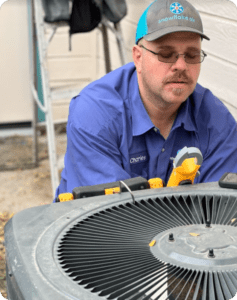 If you replace a heat pump before it breaks down for good, you’ll get an instant upgrade in terms of performance and efficiency. And, you won’t worry about a system breaking down when you need it the most. But, you still want to get the most out of your old system.
If you replace a heat pump before it breaks down for good, you’ll get an instant upgrade in terms of performance and efficiency. And, you won’t worry about a system breaking down when you need it the most. But, you still want to get the most out of your old system.
Heat pumps do a better job of retaining their efficiency than conventional heaters. That means, over time, they won’t require a lot more power than before to do the job.
That’s different from furnaces, which often need a lot more gas or electricity toward the end of their service.
But, today’s heat pumps work much better than older models. That means you don’t need to invest in the latest-and-greatest new heat pump to see an improvement over your old one.
Even a mid-range heat pump today, or at least a comparable model to the one you have, will work better than the one you’ve had for more than a decade. And, if you’re replacing an air conditioner, a heat pump will provide plenty of benefits over traditional AC.
Four Signs You May Need A New Heat Pump
Four indications you may need a new heat pump are:
- Your System Is More Than 15 Years Old
- You Make More Repair Calls
- Your Home Isn’t As Comfortable
- Your Electric Bill Keeps Rising
Let’s look at these more closely:
Your System Is More Than 15 Years Old
Now, we’re not saying that every fifteen-year-old system is ready for replacement. But, remember: That’s about the average lifespan.
That means once you hit this point, you need to consider the age of the unit for your future decisions.
First of all, the warranty is no longer valid. So, you’re paying full price for any repairs (unless you have a good maintenance contract).
Second, today’s heat pumps work much better than previous models. That means even getting a comparable model to your current one means better comfort — and a lower electric bill!
The new ones are also much more energy efficient. And, in 2023, the Inflation Reduction Act will provide financial incentives for going with a heat pump over most conventional systems.
Read More: Rebates and Financing Options For Treasure Valley Heat Pump and Mini Split Installations
You Make More Repair Calls
A big sign your system is on the way out is if it breaks down more often than it did before. Sure, this sounds obvious. But, it’s a problem that can sneak up on many people.
Check your records, or call your HVAC contractor to pull theirs. Have you had them come out much more often over the past year or two? If so, you’re probably seeing the signs of wear and tear taking their toll on an older system.
At this point, it’s a question of how much money to keep putting into an old system before it’s no longer worth the investment.
It’s a tough call and not something we can tell you in a general article. If your system is over 15 years old and you call more often for repairs, start talking to your contractor about planning for a new one.
At the least, start browsing models and thinking about financing. That way, you’re all set if your system goes down for good.
Your Home Isn’t As Comfortable
Heat pumps have a reputation for providing excellent comfort. So, when that stops being the case, something’s up.
Most times, a problem won’t cause a breakdown immediately. Instead, your system just won’t work as well as it used to. That means rooms are too cold in the winter or too hot in the summer.
Once again, it’s a problem that can creep up on you. In this case, it’s because your heat pump’s performance will slowly get worse over time.
If you haven’t had any preventative maintenance done in a while (more on that a little later), then now’s the time. With any luck, a quick tune-up or minor repair solves the problem.
If not, and if your system’s on the older side, it’s time to start considering a replacement.
Your Electric Bill Keeps Rising
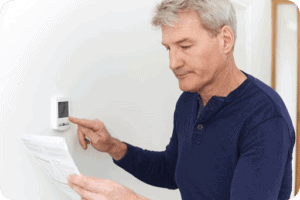 Heat pumps are also known for using very little electricity. That’s why many people switched to them from a conventional system. So, if your electric bill keeps rising, that’s a cause for concern.
Heat pumps are also known for using very little electricity. That’s why many people switched to them from a conventional system. So, if your electric bill keeps rising, that’s a cause for concern.
As a system gets older, it struggles to keep up with demand. As we discussed previously, that could mean hot or cold spots in the house.
The other symptom is rising electric bills: The heat pump needs more power to do the job.
How To Make Your Heat Pump Last Longer
There are two easy ways to extend the life of your heat pump by quite a few years. You’ll also enjoy better comfort and lower bills along the way. They are:
- Annual Maintenance
- Regular Cleanings
With regular service, you’ll avoid many problems that cause a heat pump to break down prematurely. When you have a professional clean out the system, inspect it, and replace any worn-down or broken parts, you keep it running smoothly and optimally.
And, if you have a mini split heat pump system, annual cleanings are vital. You’d be amazed (and a little grossed out) by what can build up inside these. Fortunately, cleanings are quick, easy, and inexpensive.
And, they can make a massive improvement on your system’s performance.
Read Real Case Studies Of Mini Split Installations In Boise Metro and Valley County
Heat Pump Installation In McCall, ID And Boise Metro
Snowflake Air is the trusted name for expert, reliable heat pump installation in McCall, ID, Boise Metro, and across the Treasure Valley. If you’re in the market for a new system or are considering converting from conventional heating and cooling, give us a call today! Starting with a free consultation, we’ll ensure you have all the information you need to make the best decision for your home and family.


